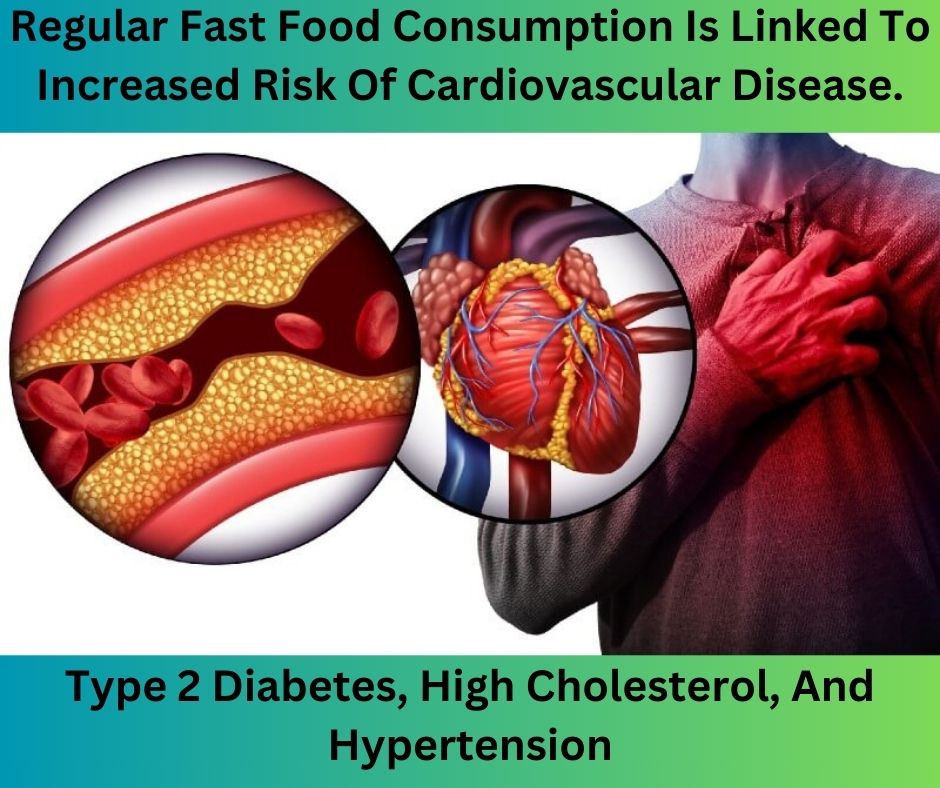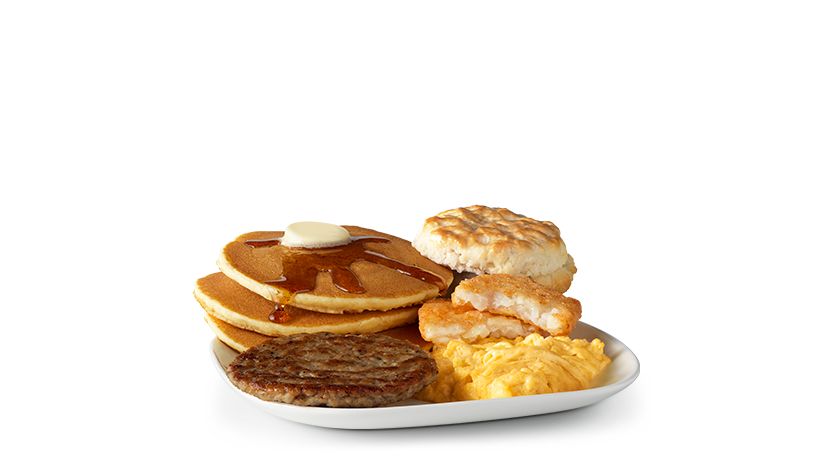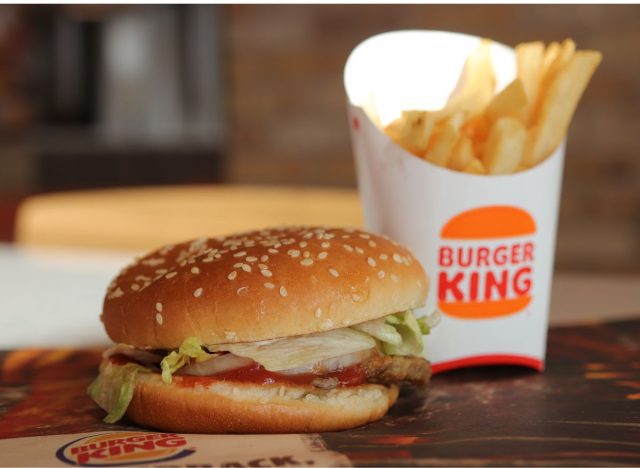

If you’re like us and enjoy a quick and convenient meal on the go, it’s important to be aware of the potential health risks associated with regular fast food consumption.
Studies have shown that indulging in fast food frequently can increase your risk of developing cardiovascular disease, type 2 diabetes, high cholesterol, and hypertension.
While many popular fast-food chains tend to have menus filled with highly processed ingredients, excessive sodium, and unhealthy fats, there are some alternatives out there.
Chains like Chick-fil-A, Chipotle, and Panera offer healthier options, allowing you to satisfy your cravings without compromising your well-being.
However, it’s crucial to be mindful of the nutritional content of your meal, as some seemingly innocent dishes may still contain hidden additives, artificial flavors, and preservatives.
So, let’s dive into the details and learn more about how different fast-food chains contribute to our health.
Fast Food consumption and Heart Disease
Fast food has become a staple in our modern society, offering convenience and quick meals on the go. However, research has shown a concerning link between regular fast food consumption and cardiovascular disease.
Cardiovascular disease is a broad term that encompasses various conditions affecting the heart and blood vessels, including coronary artery disease, heart attack, and stroke.
When we consume fast food regularly, we expose ourselves to several risk factors that contribute to the development of cardiovascular disease.
Fast food typically contains high levels of calories, saturated fats, and trans fats, which can lead to an increase in LDL cholesterol, also known as “bad” cholesterol.
This elevated LDL cholesterol can cause the build-up of plaque in the arteries, narrowing the blood vessels and compromising blood flow to the heart and other organs.
In addition to the high-fat content, fast food is often high in sodium. Excessive sodium intake can raise blood pressure, putting additional strain on the cardiovascular system and increasing the risk of hypertension and other heart-related problems.
Effects of high calorie and saturated fat intake on cardiovascular health
Fast food meals are often calorie-dense, meaning they contain a significant number of calories in a relatively small portion size.
Regularly consuming high-calorie meals can contribute to weight gain and obesity, both of which are associated with an increased risk of cardiovascular disease.
Moreover, fast food is notorious for its high saturated fat content. Saturated fats can raise levels of LDL cholesterol in the blood, increasing the risk of plaque build-up and ultimately leading to heart disease.
Saturated fats are commonly found in foods such as burgers, fries, and fried chicken, which are all staples of many fast food menus.
It is important to note that while fast food consumption alone may not directly cause cardiovascular disease, it significantly contributes to the development of risk factors that can lead to these conditions.
Incorporating healthier choices and reducing the frequency of fast food consumption is crucial for maintaining cardiovascular health.
The Relationship Between Fast Food Consumption and Type 2 Diabetes
Fast food and insulin resistance
Type 2 diabetes, a chronic condition characterized by high blood sugar levels, is another health concern associated with regular fast food consumption.
The excessive intake of fast food, particularly foods high in sugar and unhealthy fats, can lead to insulin resistance.
Insulin resistance occurs when the body’s cells become less responsive to the action of insulin, a hormone that helps regulate blood sugar levels.
When insulin resistance develops, the body must produce higher levels of insulin to compensate, leading to an overproduction of this hormone.
Over time, the body may lose its ability to produce enough insulin, resulting in the development of type 2 diabetes.
Role of high sugar intake in diabetes development
Fast food often contains high levels of added sugars, which can contribute to weight gain, obesity, and the development of insulin resistance. Sodas, milkshakes, and desserts are typical examples of sugary items frequently found on fast food menus.
Moreover, consuming foods high in sugar can lead to a rapid increase in blood sugar levels, causing the pancreas to release more insulin to bring those levels back down. Over time, the constant demand for insulin production can exhaust the pancreas, increasing the risk of developing type 2 diabetes.
Limiting fast food consumption and opting for healthier alternatives that include nutrient-dense foods can help prevent or manage diabetes. It is essential to prioritize whole grains, lean proteins, fruits, and vegetables while minimizing the intake of added sugars and unhealthy fats.
The Impact of Regular Fast Food Consumption on Cholesterol Levels
Fast Food and LDL cholesterol
High levels of LDL cholesterol in the blood, often referred to as “bad” cholesterol, are strongly linked to an increased risk of cardiovascular disease. Unfortunately, fast food meals often contribute to elevated LDL cholesterol levels due to their high saturated and trans fat content.
Saturated fats, found predominantly in animal products and some plant-based oils, can raise LDL cholesterol levels. Fast food items like burgers, cheese, and fried chicken commonly contain significant amounts of saturated fats.
In addition to saturated fats, trans fats are often present in fast food due to the use of partially hydrogenated oils.
Trans fats not only raise LDL cholesterol levels but also lower levels of HDL cholesterol, which is considered “good” cholesterol. When both LDL cholesterol levels are elevated and HDL cholesterol levels are decreased, the risk of heart disease significantly increases.
Effects of high saturated and trans fat intake on Cholesterol
Regularly consuming fast food that is high in saturated and trans fats can have a detrimental impact on cholesterol levels. These unhealthy fats contribute to the accumulation of plaque in the arteries, impairing blood flow and increasing the risk of heart-related issues.
To maintain healthy cholesterol levels, it is important to limit fast food consumption and focus on a well-balanced diet that includes sources of unsaturated fats, such as avocados, nuts, and fatty fish. Incorporating these healthier fats into our meals can help improve cholesterol profiles and reduce the risk of cardiovascular disease.
The Connection Between Fast Food Consumption and Hypertension
Fast food and high blood pressure
Hypertension, or high blood pressure, is a common condition that significantly increases the risk of cardiovascular disease. Regularly consuming fast food, which is often high in sodium, can contribute to the development of hypertension.
Sodium, a component of salt, plays a crucial role in regulating fluid balance and blood pressure. However, excessive sodium intake can disrupt this balance, leading to increased blood volume and increased pressure on the arterial walls.
Fast food meals, particularly processed and fried options, are typically high in sodium. Items like French fries, fried chicken, and processed meats can contain alarming amounts of added salt, further exacerbating sodium intake and increasing the risk of hypertension.
Role of sodium intake in hypertension development
Research has consistently shown a positive correlation between high sodium intake and hypertension. By reducing sodium intake and adopting a lower-sodium diet, blood pressure can be effectively managed and reduced.
To minimize sodium intake, it is essential to limit fast food consumption and opt for homemade meals using fresh ingredients.
Additionally, reading food labels and choosing low-sodium alternatives can help individuals decrease their overall sodium intake and maintain healthy blood pressure levels.
Fast Food Chains with Healthier Alternatives to Reduce Risks
While fast food has gained a reputation for its negative impact on health, there are some fast-food chains that have embraced healthier alternatives for those who are looking to reduce their risk of developing diseases associated with fast food consumption. Three notable examples include Chick-fil-A, Chipotle, and Panera.
Chick-fil-A’s healthier menu options
Chick-fil-A offers a variety of menu options that include lean protein sources, salads, and grilled items. Their grilled chicken sandwich and nuggets serve as healthier alternatives to the traditional fried options.
Additionally, Chick-fil-A provides a variety of salad options, made with fresh vegetables, protein, and lighter dressings, promoting a nutrient-rich meal choice.
Chipotle’s emphasis on fresh ingredients and customization
Chipotle takes pride in sourcing high-quality ingredients and offering customization options that cater to individual dietary preferences.
They prioritize whole foods such as lean proteins, whole grains, and vegetables. By allowing customers to build their own meals, Chipotle gives individuals the power to create a balanced and personalized dish.
Panera’s focus on nutritious choices
Panera focuses on providing a wide range of nutritious choices to its customers. They offer a variety of soups, salads, sandwiches, and bowls that incorporate whole grains, lean proteins, and fresh produce.
Panera has also made commitments to remove artificial ingredients and additives from their menu items, further emphasizing their dedication to health-conscious options.
By choosing these healthier alternatives at fast-food chains, individuals can reduce their exposure to the negative health effects often associated with regular fast food consumption.
These options prioritize nutrient-dense ingredients, lower levels of unhealthy fats and sodium, and provide an opportunity to make more mindful choices while eating out.
McDonald’s: Highly Processed Ingredients and Unhealthy Menu Items

This Image is The Property of mcdonalds.com
Processed ingredients used by McDonald’s
McDonald’s, one of the largest fast-food chains globally, has faced significant criticism for its use of highly processed ingredients.
Many of the items on the menu contain artificial preservatives, flavors, and additives that contribute to the taste, texture, and extended shelf life of the food.
Highly processed ingredients often lack the essential nutrients found in whole foods, making these items less nutritious overall.
Frequent consumption of such ingredients can contribute to an increased risk of various health conditions, including cardiovascular disease, type 2 diabetes, and obesity.
High-calorie menu items at McDonald’s
McDonald’s is known for its high-calorie meals, often exceeding the recommended daily calorie intake for an average adult with just one item.
Signature menu items like Big Macs, Quarter Pounders, and large fries can contain significant amounts of calories, unhealthy fats, and sodium.
Consuming these high-calorie meals regularly can contribute to weight gain, obesity, and an increased risk of developing chronic health conditions.
It’s essential to be mindful of portion sizes and nutritional content when choosing items from the McDonald’s menu.
Sodium content in McDonald’s meals
Sodium is a mineral that is naturally present in foods and plays a crucial role in bodily functions. However, excess sodium consumption can lead to health issues, particularly related to heart health.
McDonald’s menu items tend to be high in sodium, especially popular options like chicken nuggets, breakfast sandwiches, and even salads when topped with dressings and condiments.
High sodium intake can contribute to the development of hypertension and other cardiovascular problems.
It is important to be aware of the sodium content in meals consumed at McDonald’s and make efforts to balance sodium intake with other lower-sodium options.
Saturated fat content in McDonald’s menu
Saturated fats, often found in animal products and certain processed foods, can raise LDL cholesterol levels and increase the risk of cardiovascular disease.
McDonald’s menu items are known to have significant amounts of saturated fats, particularly in items like burgers, cheese, and fried chicken.
Regularly consuming fast food with high saturated fat content can contribute to the development of high cholesterol levels and increase the risk of heart disease and other related conditions.
It is important to be conscious of the amount of saturated fats in our diets and choose healthier alternatives whenever possible.
Burger King: High Calories, Cholesterol, Saturated Fat, and Sodium


Caloric content of meals at Burger King
Burger King, another prominent fast-food chain, offers a wide range of menu items that are often high in calories. Options such as the Whopper, Bacon King, and Triple Stacker contain significant amounts of calories, contributing to increased calorie intake when consumed regularly.
Excessive calorie consumption can lead to weight gain, obesity, and an increased risk of various chronic conditions, including cardiovascular disease, type 2 diabetes, and hypertension.
It’s important to consider the nutritional content of meals at Burger King and make informed choices for our health.
Cholesterol and saturated fat in Burger King’s menu
Burger King’s menu items, particularly their burgers and fried chicken sandwiches, can contain high levels of cholesterol and saturated fats. Both cholesterol and saturated fats contribute to the development of cardiovascular disease by raising LDL cholesterol levels, promoting plaque build-up in the arteries.
Regularly consuming meals that are high in cholesterol and saturated fats can increase the risk of heart disease and other related conditions. It is essential to be mindful of the nutritional content and opt for healthier choices that are lower in cholesterol and saturated fats.
Sodium levels in Burger King’s offerings
Burger King’s menu items are often high in sodium content, contributing to increased sodium intake when consumed regularly. Items such as French fries, onion rings, and sandwiches can contain significant amounts of salt.
Excess sodium consumption can lead to fluid retention, increased blood pressure, and an increased risk of hypertension. Monitoring sodium intake is crucial for maintaining heart health, and individuals should be cautious when choosing options from the Burger King menu.
Checkers & Rally’s: Unhealthy Fats, Sodium, and Lack of Nutrients


Unhealthy fats in Checkers & Rally’s menu items
Checkers & Rally’s is a fast-food chain known for its indulgent and large portion sizes. However, many of their menu items contain high levels of unhealthy fats.
Foods like burgers, fries, and fried chicken are often prepared with oils and cooking methods that contribute to unhealthy fat levels.
Regularly consuming foods high in unhealthy fats can increase the risk of obesity, heart disease, and other chronic conditions. It is important to make informed choices and limit our intake of these unhealthy fats when dining at Checkers & Rally’s.
Sodium content in Checkers & Rally’s offerings
Like many other fast-food establishments, Checkers & Rally’s menu items tend to be high in sodium content. Items such as battered fries and seasoned burgers often contain significant amounts of added salt.
Excessive sodium intake can contribute to fluid retention, high blood pressure, and an increased risk of cardiovascular problems. Being aware of the sodium content in the meals we choose and striving to balance sodium consumption with lower-sodium options is important for maintaining heart health.
Lack of essential nutrients in Checkers & Rally’s meals
In addition to the high levels of unhealthy fats and sodium, many of Checkers & Rally’s menu items lack essential nutrients. These meals often lack significant amounts of fruits, vegetables, whole grains, and lean proteins.
A diet that is lacking in essential nutrients can lead to various nutritional deficiencies and increase the risk of developing chronic conditions.
When dining at Checkers & Rally’s, it is crucial to make efforts to incorporate nutrient-dense foods into our meals to ensure a balanced diet.
KFC: High Fat, Genetically Modified Ingredients, and Trans Fats
Fat content in KFC’s fried chicken
KFC, known for its fried chicken, is a fast-food chain that serves meals with high-fat content. Fried foods are commonly cooked in oil, resulting in higher levels of unhealthy fats.
Regularly consuming fried chicken and other high-fat foods can contribute to weight gain, obesity, and an increased risk of heart disease and other related conditions.
It is important to be mindful of portion sizes and the frequency of consumption when choosing items from the KFC menu.
Use of genetically modified ingredients by KFC
Genetically modified organisms (GMOs) are organisms whose genetic material has been altered through genetic engineering techniques. KFC has faced criticism for its use of genetically modified ingredients in some of its menu items.
While there is ongoing debate surrounding the safety and long-term effects of GMOs on human health, some individuals choose to limit their consumption due to concerns about potential risks.
Making informed choices about the ingredients used by KFC and opting for alternatives that prioritize non-GMO ingredients can provide individuals with peace of mind.
Trans fat content in KFC’s products
Trans fats are artificial fats that are created through the process of hydrogenation, which solidifies liquid oils. These fats can increase LDL cholesterol levels and decrease HDL cholesterol levels, leading to an increased risk of heart disease.
KFC’s menu items, particularly their fried chicken, have been found to contain trans fats. Regular consumption of trans fats can have negative implications for cardiovascular health.
It is important to be aware of the trans fat content in our diets and choose healthier options whenever possible.
Artificial flavors, preservatives, and additives in KFC’s side dishes
In addition to the concerns related to fats and GMOs, KFC’s side dish offerings have been found to contain artificial flavors, preservatives, and additives.
These ingredients are used to enhance taste, improve shelf life, and maintain consistency in the products.
While these ingredients are generally recognized as safe for consumption, some individuals may prefer to minimize their exposure to artificial additives and preservatives.
Opting for homemade side dishes or healthier alternatives that prioritize fresh, whole ingredients can provide a more wholesome dining experience.
In conclusion, regular fast food consumption has been strongly linked to an increased risk of cardiovascular disease, type 2 diabetes, high cholesterol, and hypertension.
While some fast-food chains have started offering healthier alternatives, it is crucial to be aware of the potential negative health impacts associated with specific establishments.
Fast-food chains like McDonald’s, Burger King, Checkers & Rally’s, and KFC have menu items high in calories, unhealthy fats, and sodium, and lack essential nutrients.
By making informed choices, opting for healthier alternatives, and reducing the frequency of fast food consumption, we can safeguard our health and well-being.







